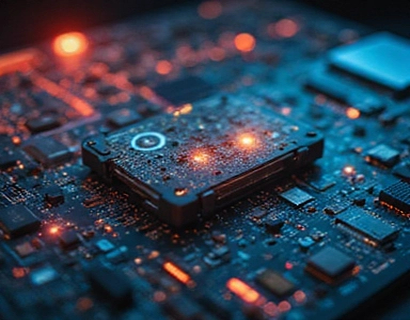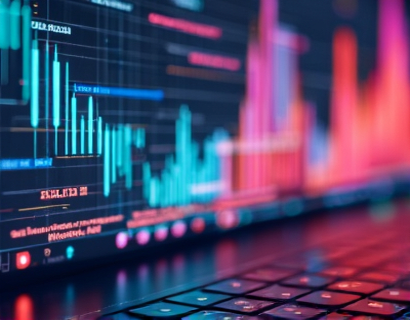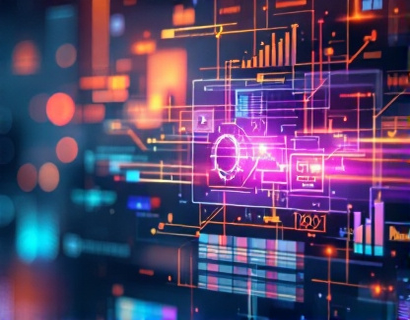The Synergy of AI and Crypto: Transforming Digital Finance
The intersection of artificial intelligence and cryptocurrency is ushering in a new era of digital finance, one that promises unparalleled efficiency, security, and innovation. This transformative fusion is not just a technological advancement but a paradigm shift in how we perceive and interact with financial systems. As we delve into this topic, it's essential to understand the foundational elements of both AI and cryptocurrency, and how their synergy is revolutionizing the landscape of digital finance.
Understanding Artificial Intelligence in Finance
Artificial intelligence, or AI, refers to the simulation of human intelligence processes by machines, particularly computer systems. These processes include learning, reasoning, and self-correction. In the context of finance, AI is leveraged to analyze vast amounts of data, identify patterns, make predictions, and automate complex tasks. The application of AI in finance spans various domains, from algorithmic trading and risk management to customer service and fraud detection.
One of the most significant advantages of AI in finance is its ability to process and analyze big data. Traditional financial systems rely on human analysts to sift through data, which is time-consuming and prone to errors. AI algorithms, on the other hand, can handle massive datasets with speed and accuracy, uncovering insights that would be impossible for humans to detect. This capability is particularly valuable in the crypto space, where market data is vast and constantly evolving.
Cryptocurrency: A Brief Overview
Cryptocurrency, a digital or virtual currency secured by cryptography, operates on a decentralized network known as blockchain. The most well-known cryptocurrency is Bitcoin, but there are thousands of others, each with unique features and use cases. Cryptocurrencies offer several advantages over traditional fiat currencies, including decentralization, transparency, and security. However, their volatility and regulatory uncertainties have also been significant challenges.
The blockchain technology underlying cryptocurrencies is a distributed ledger that records transactions across multiple computers. This decentralized nature ensures that no single entity has control over the entire network, making it resistant to censorship and tampering. The transparency of blockchain, where all transactions are visible to network participants, enhances trust and accountability in financial transactions.
AI in Cryptocurrency: Enhancing Trading and Investment
The combination of AI and cryptocurrency has led to the development of intelligent trading systems that can analyze market data, predict price movements, and execute trades with minimal human intervention. These AI-driven trading bots use machine learning algorithms to learn from historical data and adapt to new market conditions. This capability allows them to make more informed decisions and potentially generate higher returns.
One of the key applications of AI in cryptocurrency trading is sentiment analysis. By analyzing social media, news articles, and other online sources, AI can gauge market sentiment and predict price fluctuations. This approach complements traditional technical and fundamental analysis, providing a more comprehensive view of market dynamics.
Another area where AI excels is in risk management. Cryptocurrency markets are notoriously volatile, and managing risk is crucial for investors. AI algorithms can monitor multiple factors, such as market trends, liquidity, and historical price data, to assess risk levels and suggest optimal investment strategies. This level of automation and precision is difficult to achieve with human traders alone.
Smart Contracts and Decentralized Applications
Smart contracts are self-executing contracts with the terms of the agreement directly written into code. They run on blockchain networks and automatically enforce and execute the terms of the contract when predefined conditions are met. AI enhances smart contracts by adding layers of intelligence and adaptability. For instance, AI can analyze real-time data to dynamically adjust contract parameters, ensuring they remain relevant and effective.
Decentralized applications (dApps) are another exciting development at the intersection of AI and cryptocurrency. dApps leverage blockchain technology to create applications that are transparent, secure, and resistant to censorship. AI can enhance dApps by providing advanced functionalities such as personalized user experiences, predictive analytics, and automated decision-making. For example, a decentralized finance (DeFi) platform can use AI to offer tailored lending and borrowing solutions based on user profiles and market conditions.
Enhancing User Experiences through AI
The user experience in digital finance is significantly improved by the integration of AI. Customer service, for instance, can be revolutionized through AI-powered chatbots that provide 24/7 support, answer queries, and guide users through complex processes. These chatbots can understand natural language, learn from interactions, and continuously improve their performance.
Personalization is another area where AI shines. By analyzing user behavior and preferences, AI can offer tailored recommendations for financial products and services. This level of personalization not only enhances user satisfaction but also increases engagement and loyalty. For example, a crypto exchange can use AI to suggest investment strategies based on a user's trading history and risk tolerance.
Security and Fraud Detection
Security is a paramount concern in the crypto space, and AI plays a crucial role in enhancing it. AI algorithms can detect anomalies and patterns indicative of fraudulent activities, such as money laundering or market manipulation. By continuously monitoring transactions and user behavior, AI can identify suspicious activities in real-time and trigger alerts for further investigation.
Additionally, AI can strengthen the security of blockchain networks by improving consensus mechanisms and enhancing cryptographic protocols. Machine learning models can predict and mitigate potential vulnerabilities, ensuring the integrity and reliability of the network. This proactive approach to security is essential for building trust and adoption in the crypto ecosystem.
Challenges and Considerations
While the synergy of AI and cryptocurrency offers numerous benefits, it also presents several challenges. One of the primary concerns is the regulatory landscape. The decentralized and borderless nature of cryptocurrencies complicates regulatory efforts, and the use of AI adds another layer of complexity. Regulators must balance innovation with the need to prevent illicit activities and protect consumers.
Another challenge is the ethical use of AI. Ensuring that AI systems are transparent, fair, and unbiased is crucial. There is a risk that AI algorithms could perpetuate existing biases or make decisions that are not in the best interest of users. Therefore, it is essential to develop and implement ethical guidelines and standards for AI in finance.
Technical challenges also exist, such as the need for robust infrastructure to support AI-driven systems. High computational power and data storage requirements can be costly and resource-intensive. However, advancements in cloud computing and distributed networks are helping to address these issues, making AI more accessible and affordable.
Future Prospects
The future of AI and cryptocurrency is bright, with numerous opportunities for innovation and growth. As AI technologies continue to advance, we can expect even more sophisticated applications in the crypto space. For instance, the integration of AI with quantum computing could lead to breakthroughs in cryptography, enhancing the security and efficiency of blockchain networks.
Moreover, the rise of central bank digital currencies (CBDCs) presents a new frontier where AI and cryptocurrency can converge. CBDCs, being digital forms of fiat currency issued by central banks, can leverage AI for improved monetary policy, financial inclusion, and cross-border transactions. The synergy between AI and CBDCs has the potential to redefine global finance and economic systems.
In conclusion, the fusion of AI and cryptocurrency is not just a technological trend but a fundamental transformation of digital finance. This synergy is enhancing user experiences, improving security, and opening up new possibilities for innovation. As we move forward, it is essential to address the challenges and ensure that the benefits of this synergy are realized in a responsible and ethical manner.










































